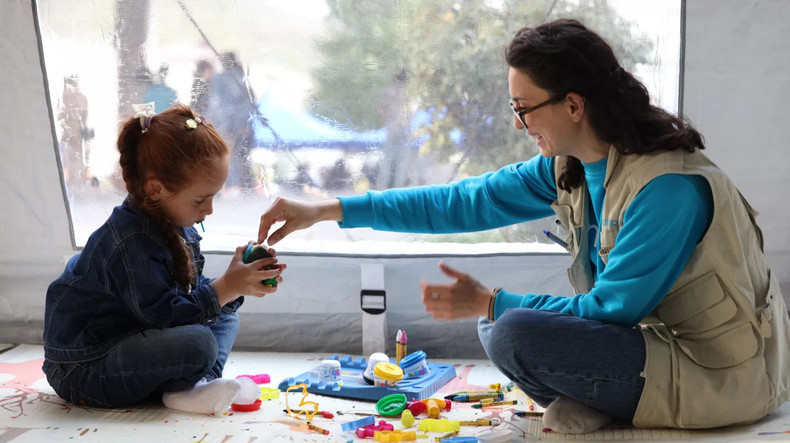
UNICEF and Germany to scale up child protection services for refugee children in Armenia
UNICEF and the German Embassy in Yerevan announced a new contribution of 2,9 million Euros from the German Federal Foreign Office in the framework of UNICEF’s 2023 humanitarian action appeal. This donation enables UNICEF to scale up support to refugee children and their families in Armenia until September 2026, UNICEF Armenia reported on Thursday.
Germany’s contribution will help to reach over 25,000 conflict-affected people in Armenia with direct service delivery of humanitarian cash, case management and mental health and psychosocial services, as well as 100,000 individuals with mental health and psychosocial well-being messaging through online platforms.
Ahead of the launch of programmatic activities, the German and UNICEF delegation also visited a child-friendly safe space in Masis, set up by UNICEF and the Armenian Association of Social Workers. The delegation was led by H.E. Ambassador Konrad Arz von Straussenburg, Director for Eastern Europe, Central Asia and Southern Caucasus, accompanied by H.E. Claudia Busch, German Ambassador to Armenia. Partners had the chance to interact with community social workers that have also supported refugee families and provided specialized support and case management.
“Germany is aware of the ongoing challenges that Armenia is confronted with in order to address the needs of more than 115 thousand refugees from Nagorno Karabakh. Therefore, we are extending our funding for the refugee response in the country. Our main goal is to reach out to the most vulnerable refugees who had to leave everything behind. We include in our assistance also people with disabilities, elderly, families, single parents, especially in remote and rural communities. Our cash assistance, mental health / psychosocial support (MHPSS) and provision of inclusive shelters still meets a high demand in Armenia.
We also want to address the burden of the host communities. Therefore, many measures, e.g. the renovation of social institutions, are set up in a way that they will be a benefit for the community as a whole”, underlined Konrad Arz von Straussenburg, during his visit.
“This contribution from Germany will enable UNICEF to implement a synergetic mix of cash assistance and care interventions with our partners to address the urgent unmet needs of affected children and their families in close coordination with the national social and child protection systems,” noted Silvia Mestroni, UNICEF Acting Representative. “As we mark one year of humanitarian response to the refugee crisis in Armenia, it’s important to remember that long-term recovery depends on the recovery of children who have been affected, including support to host communities to match limited resources with the increased need.”
The interlinked interventions will be implemented starting with an assessment of residual needs of refugee children and their families, including children with disabilities, which will help identify and target support where most needed. In collaboration with the state and civil society partners, UNICEF will train social service workforce, including frontline professionals on case management support to affected populations, ranging from the identification of needs to protection from violence, abuse and harmful practices, as well as prevention of family separation.
Social workers will be provided with resources, including awareness raising materials for household visits, to identify and assess children’s needs and make referrals to other social services when necessary. Families identified as in need of financial support to address urgent priorities will be provided with multipurpose cash assistance, aligned with the Government cash programme.
UNICEF and partners will also reach families in need of parenting support and mental health and psychosocial assistance through tailored group and individual sessions, evidence-based information and awareness raising, offline and online, ensuring improved psychological well-being and family environment.
For the period 2024/25 Germany is providing almost 5 million Euros through its partner organizations UNICEF (2,9 million Euros) and the NGO Sign of Hope (1,9 million Euros) to the humanitarian response.
Newsfeed
Videos






























